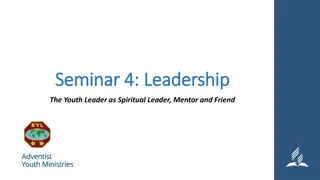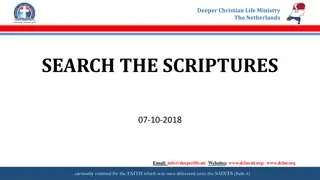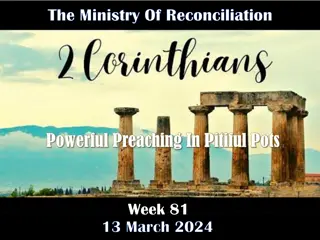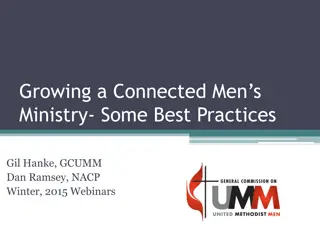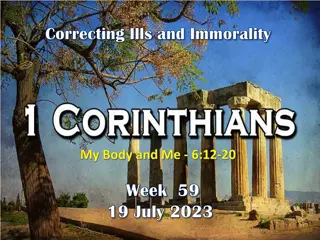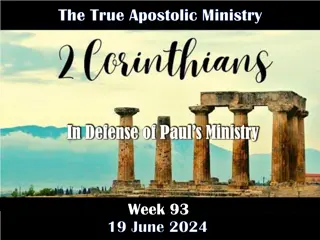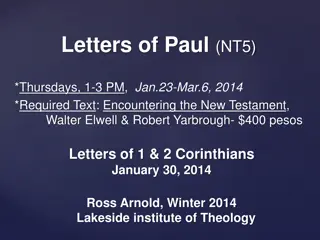Understanding the Realities of Christian Ministry through 2 Corinthians Insights
Delve into the honest portrayal of ministry in the book of 2 Corinthians, where Paul addresses the challenges, hardships, and expectations faced by those involved in Christian ministry. Explore the themes of authenticity, hardships, emotional dimensions, and personal holiness that shape the journey of ministry as depicted by Paul in this profound letter.
Download Presentation

Please find below an Image/Link to download the presentation.
The content on the website is provided AS IS for your information and personal use only. It may not be sold, licensed, or shared on other websites without obtaining consent from the author. Download presentation by click this link. If you encounter any issues during the download, it is possible that the publisher has removed the file from their server.
E N D
Presentation Transcript
The Realistic Portrait of Ministry The Realistic Portrait of Ministry The Brutal Realities of Ministry The Brutal Realities of Ministry Week 85 10 April 2024
2 CORINTHIANS INTRODUCTION In our continuing study of Second Corinthians, the themes of this letter revolves around both the theological concepts and the practical aspects of Christian living. The primary issue at Corinth was the recognition of authentic ministry and submission to apostolic authority. Paul s corrective was to provide guidance and encouragement as the church navigates the challenges that continue to influence their unity, discipline, and spiritual growth. Our study tonight begins a new section: The Realistic Portrait of Ministry (6:1-7:16). In this section Paul paints a fair and balanced picture of what a life of ministry demands. He had already addressed TheCrucial Concerns of Ministry (1:1-3:18)and described the purpose of The Ministry of Reconciliation (4:1-5:21).
2 CORINTHIANS INTRODUCTION In this new section, we will see in the midst of the ups and downs of ministry, Paul still choose optimism over pessimism, trusting that the Corinthians will continue on the path of righteousness. Paul begins by presenting a candid description of the brutal hardships of Christian ministry (6:1-10). He urges the Corinthians, as temples of the Holy Spirit, to a life of personal and corporate holiness (6:11-18). He discusses the very personal, emotional dimension of ministry hardship (7:1-7). He recounts how he felt about of the Corinthians difficult reception of his earlier letter. (7:8-16).
2 CORINTHIANS - LESSON OVERVIEW Swindoll . . . opens our study with a little humor around some of the strange ideas we have about ministry and what goes on in ministers lives during the week. He says . . . My heart goes out to the bewildered churchgoer who said on one exasperating occasion, My problem is that God is a lot like our preacher. I don t see Him through the week, and I don t understand Him on Sunday. Many people wonder about their preachers during the week. If they don t see them on Wednesday night or run into them shopping or attending some other local event. People have all kinds of unusual ideas what a minister s life might be like. What does that pastor do all week?
2 CORINTHIANS - LESSON OVERVIEW Some think ministry is an ivory-tower affair. They picture a place of stained-glass solitude where pastors pore over the Scriptures in a study, surrounded by endless shelves of books. They see ministry as a virtual monastic life of solitude and study expect for a few hours on a Sunday. Others think ministry is for super spiritual models of perfection. Mature saints whose lives are all together and who get paid to live the way nobody else in the congregation can. On the negative side, others might think a minister is simply a well-polished charlatan, skilled in emotional manipulation and slick exploitation. Some, especially harsh cynics, look at pastors, not as pious monks, but as powerful moguls who like to tell people what to do.
2 CORINTHIANS - LESSON OVERVIEW None of these estimations are true, people in ministry are neither perfect nor fiendish. All of us have weaknesses, problems, imperfections, and blemishes. We aren t always loving or patient, unselfish or forgiving. We can succumb to temptations and suffer from trials, just like anybody else. Minister are imperfect people living in an imperfect world, called to a seemingly insurmountable task. Yet, God continues to call and set apart ministers for every generation pastors, professors, evangelist, and missionaries. Sunday school teachers, children and youth volunteers; mentors, small group facilitators, counselors, musicians, and worship leaders, all imperfect people called with a holy calling.
2 CORINTHIANS - LESSON OVERVIEW In chapter 5, Paul said that if we have been reconciled to God, we have been given a ministry of reconciliation (5:18). God Himself has committed some kind of ministry to each on us, not merely to a select elite (5:19). All believers are called to be His ambassadors (5:20). Therefore, each of us, regardless of our particular role in ministry, should be prepared to handle ministry brutal realities realities that Paul addresses during our lesson tonight in 6:1-10.
2 CORINTHIANS 6:1-3 1We then, as workers together with Him also plead with you not to receive the grace of God in vain. 2For He says: In an acceptable time I have heard you, And in the day of salvation I have helped you. Behold, now is the accepted time; behold, now is the day of salvation. 3We give no offense in anything, that our ministry may not be blamed.
2 CORINTHIANS 6:1-3 Paul begins this description of the realities of ministry with twoexhortations that will help us when we face trials, temptations, hardships, and the frustrations of ministry. 1) Do not Receive the Grace of God in Vain (6:1-2). 2) Cultivate Credibility in Ministry (6:3-4). FIRST Do not Receive the Grace of God in Vain. On the heels of his own call to take seriously the ministry of reconciliation as an ambassador of Christ, Paul exhorts the Corinthians to receive the grace of God with sincerity and urgency (6:1). This could refer to the saving work of Jesus Christ (5:21) the reconciliation that occurs through the His substitutionary death for us.
2 CORINTHIANS 6:1-3 It could also refer to the ministry of reconciliation granted not only to the apostles, but to all believers in Christ (5:18-21). This is not and either/or situation, Paul mentions both in 5:18 saying, Now all things are of God [that s grace in general], who reconciled us to Himself through Christ [that s saving grace] and gave us the ministry of reconciliation [that s the grace of ministry]. In this context, the danger of receiving the grace of God in vain (6:1) refers to the tragedy of a fruitless ministry. The word vain in Greek is kenos (ken-nos'), which means empty, without results, useless, and devoid of truth.
2 CORINTHIANS 6:1-3 Our ministry can be fruitless in at least twoways: FIRST when it embrace a graceless Christian lifestyle that depends on self rather than on the spirit. This reduces the Christian faith to a religion of works- related righteousness rather than the righteousness that comes only by grace. When a person fails to live by grace, their ministries will be law-oriented rather than grace-oriented. It will not be a ministry of reconciliation to God but alienation from God (Eph. 2:13-19). That s the kind of works-based ministry the Judaizers embraced, so the message of the atoning work of Christ just ricocheted off their hearts like arrows off a plate of steel.
2 CORINTHIANS 6:1-3 SECOND our ministry can be fruitless when it fails to take advantage of present ministry opportunities. Paul looks back to Isaiah 49:8 to support his statement: Thus says the Lord, In a favorable time I have answered You, and in a day of salvation I have helped You; and I will keep You and give You for a covenant of the people, to restore the land, to make them inherit the desolate heritages. In other words, Isaiah is saying to God s peoplethat God will make them a covenant for others, and that through their restoration and salvation, they will be a light to the nations and will bring blessings to a land that was once desolate. You are My Servant, Israel, in whom I will show my glory (Isa. 49:3).
2 CORINTHIANS 6:1-3 When Israel utterly failed to reflect God s glory among the nations, Jesus Christ succeeds, fulfills the will of the Father and pays the price for Israel s redemption. Israel s refusal to accept Jesus as Messiah and rejection of His lordship; in turn, extended the new covenant ministry of reconciliation to the Church. Now, it is the church s role to carry on Christ s proclamation of salvation not only to Israel, but also to all the nations. Why? Because now is the acceptable time and the day of salvation (6:2). As long as we have breath, we should act as Christ s covenant ambassadors, working together with Him (6:1) to make disciples of all nations (Matt 28:19).
2 CORINTHIANS 6:1-3 SECOND Cultivate Credibility in Ministry: How do we, as imperfect ministers of the gospel, keep the new covenant ministry from getting discredited? By not giving any cause for offense (6:3) and by being faithful servants, just as Christ is the faithful Servant (6:4). The Greek word for discredited (m m omai), means to find fault or blame. The Hebrew equivalent is dishonor (q l wn) it means shame. Our ministry can be discredited when we: Break Promises Exploit Disciples Live Hypocritically Betray Confidences
2 CORINTHIANS 6:1-3 Our ministry can be discredited when we (cont): Compromise Principles Sacrifice Integrity Indulge Greed Live Opulently Behave Lustfully Lead Selfishly Sadly, we could keep on adding to this already harrowing list. Any one of these behaviors could topple our ministries and bring shame and dishonor to the gospel.
2 CORINTHIANS 6:4-10 4But in all things we commend ourselves as ministers of God: in much patience, in tribulations, in needs, in distresses,5in stripes, in imprisonments, in tumults, in labors, in sleeplessness, in fastings;6by purity, by knowledge, by longsuffering, by kindness, by the Holy Spirit, by sincere love,7by the word of truth, by the power of God, by the armor of righteousness on the right hand and on the left,8by honor and dishonor, by evil report and good report; as deceivers, and yet true; 9as unknown, and yet well known; as dying, and behold we live; as chastened, and yet not killed; 10as sorrowful, yet always rejoicing; as poor, yet making many rich; as having nothing, and yet possessing all things.
2 CORINTHIANS 6:4-10 Paul continues to paint this honest picture of authentic Christian ministry, he lays aside the pastel palette that would naturally attract people to ministry. Now, he reaches for darker hues that shock the senses and present a realistic picture of the life of those who have commended themselves as servants of God. The word servant here is the Greek word diakonos . . . it means servant with a certain mission or task, an assistant of a particular person, or an official appointment, office, or position in a local church. Paul and his companions, were sold out for the gospel ministry, they saw themselves as conscripted servant of God Himself, assigned with the specific task of proclaiming the Word far and wide.
2 CORINTHIANS 6:4-10 This ministry did not come with competitive compensation, a great benefits package, or a comfortable retirement plan. Paul s description destroys every false image of Christian ministry. Under its weight, the ivory-tower image collapses, the perfect-saint portrayal fades, and the in-it-for-the- money idea loses credibility. Look at how Paul describes the brutal reality of Christian ministry: He serves the Lord in much endurance, in afflictions, in hardships, in distresses, in beatings in imprisonments, in tumults, in labors, in sleeplessness, in hunger (6:4-5).
2 CORINTHIANS 6:4-10 That s not exactly the description you would expect to find in a seminary brochure, hear from a pastoral search committee or those recruiting ministry volunteers. While, not all ministers will encounter extreme ministry hardships like Paul describes. All ministers must prepare for both pleasant and unpleasant times. In other words, they must be prepared to endure (6:4). The Greek word for endurance is (hypomon ). William Barclay says . . . It describes the ability to bear things in such a triumphant way that it transfigures them. Paul s life was the model of enduring hardships for the sake of ministry. We learn two things from his ministry model [1] the trials he endured (6:4-5), and [2] the attitudes he maintainedin the midst of those trials (6:6-7).
2 CORINTHIANS 6:4-10 1) Various trials endured (6:4-5). Paul battled inner struggles afflictions, hardships, and distresses. His afflictions or pressures included concerns that pressed in and weight him down. His hardships required that he do without those things that make life comfortable and secure. His distresses pushed him into tight spots, where he felt cornered and trapped. We get a picture of a minister who had become stressed out, mentally and emotionally drained. Moreover, Paul experienced external troubles beatings, imprisonment, and tumults. His beatings were physically painful, even torturous.
2 CORINTHIANS 6:4-10 He had been in prison many times, and his tumultuous situations landed him in the midst of violence, public outcries, and assaults. Paul was severely persecuted, and physically brutalized by his enemies. Additionally, Paul endured the private disciplines of commitment to the cause: labor, sleeplessness, and hunger. Whatever it took to advance the cause of the gospel, he did it with little regard for his own well-being. He worked tirelessly and without ceasing to spread the gospel throughout the world. Yet he counted it all beneficial for the joy of the cross (11:23-28).
2 CORINTHIANS 6:4-10 2) Vital attitudes maintained (6:6-7). Paul now fills in the dark tones of his painting with nine reminders that even in the midst of the gloom, God is present to see us through. Paul served the gospel ministry in purity, in knowledge, in patience, in kindness, in the Holy Spirit, in genuine love, in the word of truth, in the power of God; by the weapons of righteousness for the right hand and the left (6:6-7). Four of these attributes are external attitudes visible to other people: purity, knowledge, patience, and kindness. The remaining five wield their power in the hidden places of the heart: the Holy Spirit, a genuine love for others, the word of truth, the power of God, and the weapons of righteousness.
2 CORINTHIANS 6:4-10 Paul s point in listing these vital attitudes, is that even in the midst of internal and external pressures . . . A believer can be sheltered, shielded, and strengthened by the fruit of the Spirit (Gal. 5:22-23), the gifts of the Spirit (1Cor. 12:4-7), and the spiritual armor of God (Eph. 6:10- 17). So, what is the result of this mixed bag of horrendous ministry experiences that we endure by God s strengthening presence and providence. We can expect our entire ministries to be characterized by both extreme ups and downs and even confusing contradictions.
2 CORINTHIANS 6:4-10 Paul describes both the ups and downs we can expect . . .
2 CORINTHIANS 6:4-10 Considering the light and dark sides of ministry, it is sometime hard to know which image we project to others as Christians, especially those of us who have chosen ministry as a vocation or rather have been chosen for ministry. In light of the brutal realities of ministry, the vital attitudes described in verses 6 and 7 become all the more important to maintain. So that even if we are experiencing more downs than ups, we can keep our heads above water and breathe the refreshing air of the Spirits sustaining grace.
APPLICATIONS OF THE LESSON Reflecting, Risking, and Leaving a Legacy
APPLICATION REFLECTING, RISKING, LEAVING A LEGACY Swindoll closes by reflecting on this question that was put to a group of people over the age of 95 years old. If you could live your life over again, what would you do differently?" Their answers fell into three general categories. They said they would: 1) Reflect more. 2) Risk more. 3) Do more things that would live on after their death. Their revealing answers are filled with wisdom and an understanding of the basics of a fruitful, abundant life.
APPLICATION REFLECTING, RISKING, LEAVING A LEGACY Their reflections on what is most important, taking chances instead of shying away from the unknown, and leaving a legacy for the future, also reveals a tinge of regret. Swindoll shares his own personal reflection says . . . I will be honest. I am thrilled by the work the Lord has given me to do. Every day I thank God for the ministry He has given me, and the ability to press on even through conflict, hardship and through controversy. Yes, I acknowledge the brutal realities of ministry, but by the grace of God I have been able to tread water when the floods of adversity pummeled my life.
APPLICATION REFLECTING, RISKING, LEAVING A LEGACY Not by my own wisdom and strength, but by the purity, knowledge, patience, kindness, love, truth, power and righteousness that have come by His Holy Spirit (6:6-7). Finally Swindoll says, I can testify without hesitation: I love the ministry with my heart and soul. While not every believer is called to full-time Christian ministry, all believers are called to do the work of ministry (Eph. 4:12). Yet! Far too many perfectly capable believers live in such a way that they are headed for a retirement of regrets: I wish I would have reflected more, risked more, and left more of a legacy.
APPLICATION REFLECTING, RISKING, LEAVING A LEGACY Don t let that be you! FIRST Reflect more! Have you reflected on your present involvement in ministry versus what you are actually capable of doing? Are there opportunities in your church which you have dismissed without even reflecting on whether you should get involved? Take some time to reflect on the ministry needs in your church, then determine specific ways you might contribute. SECOND Risk more! Are you playing it safe, refusing to take risk? Are you avoiding outreach opportunities because of the risk involved to your pride, schedule, or your comfort?
APPLICATION REFLECTING, RISKING, LEAVING A LEGACY Take a look at your travel, work, ministry and leisure plans over the coming year and ask yourself whether you are playing it toosafe. THIRD Leave a Legacy! Will anything you are doing now live on after you die? Are you throwing yourself into work or efforts to the neglect of your family and church? When you get to the end of your life, what will be the legacy of eternal significance you leave behind? Are you discouraging your children and grandchildren from engaging in vocational ministry for more lucrative, but less eternally significant careers? Ministering to others is a noble calling. It doesn t have to be vocational, paid ministry.
APPLICATION REFLECTING, RISKING, LEAVING A LEGACY Any positive impact you can have on other believers or unbelievers will echo into eternity. Yes, ministry is hard. It can be mentally draining, emotionally painful, and physical demanding. When not balanced by consistent prevailing prayer, mixed with essential attitudes to keep us afloat, we can sink under the stress and surrender to its incessant demands and deadlines. However, when we endure the tough times, ministry is the most rewarding and satisfying life anybody can live.
NEXT CLASS 17 April 2024 Before next class, read the below chapters in Before next class, read the below chapters in the KJV and in one other versions of the Bible, the KJV and in one other versions of the Bible, i.e., NIV, NRSV, TLB, CEV, etc i.e., NIV, NRSV, TLB, CEV, etc Chapter 6:11 18 Good Relationships and Bad Partnerships



